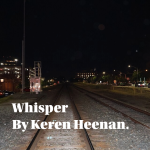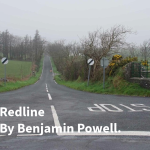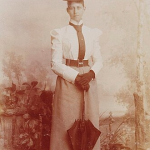Interviewer: Antonia Cassetta
Peter: I’ve been writing since I was…probably twelve. I started writing haiku poetry in the sixth grade and, shortly after that, I became interested in the Beat Generation, and I started reading Ginsberg and Corso and Ferlinghetti, some Burroughs. And then started to write, you know, more serious poetry, in the first person and then gradually evolved into writing things that were more…structured and more like contemplations of, of nature or objects and I got a lot of that from Wallace Stevens and Richard Wilbur…developing a metaphysical conceit about things. One of my favourite Paul Stevens poems is: I placed a jar in Tennessee, and round it was, upon a hill…and he sort of—or that, when the poem about the, the line that light is the line that comes down to drink. So, he did a lot of things where you would, assign…qualities to objects and to make metaphorical ideas out of them. And, The Vigil came a lot out of that, and The Vigil came out of one sentence I had written down for some reason: salty blankets of crushed crabs. And somehow that became a germination of the book, you know, just one thing after another. But that gave me a sense of where to begin. And, the publisher, mentioned that that, the book is about grief…the way that the character Unda mourns for his lost daughter and it turns into this, this nightmarish scenario in his mind and he, you know, loses his grip on reality.
Antonia: I want to pry a little bit more about your main ethos for writing. Why do you specifically choose to write, and why have you been writing for so long?
Peter: It’s kind of like a way to keep track of your, sense of yourself. It’s like its kind of like the writing is an outlet. It’s a catharsis. It’s, a probing tool. I try to find things that appeal to me. In perceptual terms, a lot of it has to do with the way things look, the way they sound. A lot of that came from reading William Carlos Williams, and, in fiction, with, another writer I admire a lot, John Hawkes, who wrote a great book called The Lime Twig, which deals a lot with, the appearance of objects and surfaces and things like that. These objects are kind of like a reflection of what the characters are feeling or thinking. And I was more influenced by reading Ginsberg: that poetry was more confessional. So I kind of drifted away from that after a certain point. And I don’t use the first person in poetry anymore. But I do use it in fiction. You know, the first-person narrator is something I like.
Antonia: In The Vigil, I was I was really interested in the specific way that you wrote Unda and Lumen’s parent-child relationship. Was there a specific reason you chose to write it that way?
Peter: There’s something that, that Margaret suggested, there was a girl that I knew that, when she was young and, you know, had some issues, and I thought that that would be, something that…it wasn’t conscious. It was like a very, subliminal thing. So, I think it was more about just telling, the story of, you know, how someone could love a child so much and be so consumed with love? One of the, the like…the Greek chorus of the people in the shop talking about what’s happening, says that the night before Lumen was, was born, they said Unda was like a little boy on Christmas Eve. You know, he loved her so much and, was just destroyed by her being taken by the scene. And then again, you have a lot of the, you know, I look—I did a lot of research looking at, you know, these Greek mythology characters and figures and relationships about gods relating to the sea…and so, so much as they come to torment him, you know, in his mind, anyway.
Antonia: I know you’ve spoken a bit about influences already, but I did—throughout all of your works, there’s a pretty strong influence specifically from, like, classic philosophy stuff, around, like, metaphysics and ontology. Could you explain why these ideas are important to you and what you get out of grappling with them in your writing?
Peter: Yeah, that’s a really good question. I think I think that, studying a lot of Beckett, had a great deal of influence on that. There was a philosopher that, my French translation is terrible, but is, you know [Arnold Geulincx]. I can’t even spell it, but he had a statement that Beckett really enjoyed, which was: where you are worth nothing, there you should seek nothing. And his way of looking at his writing, compared to Joyce, he said Joyce was a synthesiser. I’m an analyser. So, like, long story short, you know, what I got from Beckett is that to take the core of a thing and to try to approach it from, from different angles…again, a quote from Marcus Aurelius said, ask a very particular thing. What is it in itself? What is it in itself? So I think, yeah, that’s where some of the, the philosophical and also, you know, the idea of, perception, you know, the relationship between, the perceiving intelligence and what’s being perceived and, you know, trying to play one of those against the other or confuse them like the ending of one of Beckett’s novels is Molloy—it’s, then I went inside and wrote. It is midnight. The rain is beating on the windows. It was not midnight. It was not raining. That’s how it gets the book, you know? So it’s like…What I like is this self-reflexive element is formal identity in, postmodern work, you know, calling attention to what it’s doing while it’s doing it, you know, that kind of thing.
Antonia: Yeah. And I thought that was, well—this is irrelevant to the interview, but I want to talk about it. In in The Confession, there was a part that you wrote that I thought was, like, very interesting, and it was like references to sort of like an academic camaraderie between people, and like, sort of taking, like just taking that extra step to actually try to understand other people. And I thought that was I thought that was so awesome.
Peter: Oh. Thank you.
Antonia: Anyway, back to The Vigil. So, as you mentioned before, about the, the Greek myth inspirations and the ocean, would you be able to speak more about that imagery?
Peter: Okay. Well, what I see, what I try to do is, The Vigil is like a kind of a collage of, separate, but, you know, sort of related voices. And what I did, with the…the sea has its own voice, and it’s always unpunctuated, you know, kind of a stream of consciousness, like a presence that consumes the way the sea is, you know, three quarters of the earth is ocean, and the sea is always talking about how Unda as a lighthouse keeper, symbolically is there to prevent a disaster, but to see in taking Lumen from him has, you know, has the last laugh. It’s a cruel voice in many respects. It’s, it’s it has some compassion, but it’s usually just, humiliating him, you know, until finally he makes the, the, the supreme sacrifice, and he sort of wants to join his daughter. So we go, he drives himself, he commits suicide. So, Yeah, I’ve always been very attracted to the ocean, and, you know, it’s like an elixir for me to be near the sea and to smell the smell. The ocean, you know? So I guess a lot of it goes, you know, it goes from childhood. I used to go to the beach with my father all the time in the in and way back in the nineteen sixties when I was a kid. So I guess, you know, the beach and the ocean.
Antonia: So I’m aware that you have, some sort of perspective on this. How do you feel about the current state of the book publishing scene and what tends to be focused on…
Peter: I’m constantly sending individual pieces out to, to journals, magazines, mostly online, but some in print or some do both. And there’s a trend and I’ve, you know, I’ve sent stuff out to probably several thousand places over the last three years. And then, you know, it’s like, that, you know, that, it just turns around and, you know, and I start over again. But about a third of them, they want you to put a submission for you, a reading fee. And I think back to, you know, writers that I’ve admired that in publishing houses that I admire, like Citylights books, Black Spiral Press, New Directions, you know, and the publishers like Ferlinghetti and, Jack Martin, Brooke Longman in New Directions, you know, I mean, it’s an abomination. I mean, I understand that things are, you know, printing has always been expensive, and it’s always been there are always obstacles. But if you have to charge writers a submission, a reading fee, you know, it’s like a film studio auditioning actors and saying, like, you got to give us fifty bucks because, you know, you auditioned. So there’s that. And then I think that a lot of it has become, you know, sort of soft handed, self-absorbed stuff. You know, it’s not about it’s not about literature anymore. It’s about, you know, what I did on my summer vacation. You know, in a lot of instances, it’s just it’s really not very, challenging literature. Let’s put it that way, you know, not that every single thing has to be on the level of Finnegans Wake or The Trial but, you know, there could be something going on besides, just relationship gossip, you know, things like that. It makes me crazy.
Antonia: Yep. And that aspect of challenging literature, I think, is exactly it. It I-I’m not sure what it is. It’s probably infinite reasons as to why, but yeah, I, I would really like to see a sort of active push towards literature that’s a little bit higher than people usually gravitate towards.
Peter: Raise the bar, you know. Yeah, I admire Other Terrain, you know, because publications like yours are really, you know, few and far between. I mean, the Paris Review was, you know, a giant of new literature, the issues go back to the early fifties. I’m sure that the editors today, you know, the ones that started it are long gone. But I came across some stuff that they put out recently, and it’s uh, it’s childish nonsense. I almost wrote back to them and said, well, what are you doing? You know, the criteria. You know what it also…this might be, a singularly American, phenomenon with, with literacy and so on. It’s kind of like what, what Lenny Dietrich said about, she said sex in Europe is a fact, in America it’s an obsession. So, you know, we’ve, like, gotten to the point where if it’s not, explicit and simple and graphically delineated, you know, nobody gets it. And the people that do get it, you know, have shrunk down to, to a very small percentage of the reading public. So, you know, it is a…we know about video games. We know about that. You know. So just look at who they are just to look at who they re-elected to be the president. You know, I mean, he’s an idiot. Let’s not get into that.
Antonia: With that in mind, do you have any specific insights for people who want to. Like to get into writing more and like how to direct themselves in that space because it is so oversaturated?
Peter: Well, the, the things the least common denominators that I’ve…learned in doing this is that you have to, you know, no matter what you write or who you send it to, you have to deal with the law of large numbers. You’re not going to get published in thirty places if you send thirty-six things out. So that’s what I’m trying to say. And the other thing is that the about writing itself is the best advice I could give as a to paraphrase a quote from Kafka, whatever it is, no matter how irrational or how, much it, it rubs against the grain of what’s happening. Listen to your inner voice and don’t let anything distract you and just follow that. That’s what I would say.
Antonia: That’s great. I love that so much.
Peter: Thank you.
Antonia: What is—what’s next for you? Do you have any future projects that you can share with us, or anything that you’re currently interested or working on?
Peter: Oh, yeah. Well, I’ve just finished, I mean, I don’t know what the odds would be of this being published in my…in my remaining time on earth, but I finished a three-part poetry collection, a hundred poems in each part. It’s called With Dyeus. Dyeus was man’s first conception of a god, a sky god. And it’s book one, book two, book three. And what I try to do is, the poems are, they use the three elements that I think are the, the literary hallmarks of, postmodern writing: compression, ellipsis, enjambment. So there are these, these units that just keep, you know, scurrying around and having a lot of ellipses, but they’re very dense in book one. And then in book two, they get they get looser, and then in book three they get even looser. Until finally at the end, the last voice says, free of a body, with Dyeus. So it’s like a little bit like structural music or structural film—did you ever see Michael Snow’s film Wavelength?
Antonia: No, I haven’t.
Peter: Oh, okay. Well, he was a very, gifted, experimental filmmaker, from Canada. This is like his hallmark film where he has this long shot of loft, and it’s forty-five minutes and little by little by little by little, zooming in to a photograph of the ocean. And then while that’s happening, things, changing the, the music is changing, the colour of the of the stock, and the idea is that, you know, in structuralism that it’s a gradual change, like a little bit like, Steve Reich, or Philip Glass music. So I tried to do that so that you wind up with these very dense, interlocking lines in book one. Well, by book three, you don’t have that anymore. And it’s a single lucid statement. And the background of it is that in twenty-seven of the three hundred poems the voice talks about, you know, the characteristic of Dyeus, this first God, and how it how it how it relates to man. So that’s my main thing. I just finished it, you know, maybe I’ll find someone who’s crazy enough to publish at some point.
Antonia: I really hope you do. That sounds fantastic.
Peter: Thank you.
Antonia: And I am really interested in the, the sort of, as you describe, interlocking, sort of cyclical, endless sort of motif because it’s so, like permeating. This is a bit irrelevant, but you probably would have heard that, Brian Wilson of The Beach Boys has just passed away, and so people have been like posting, you know, about it online and whatever. And there’s this really good quote from this book that talks about, the end of the song, God Only Knows and about how like sort of the refrain is like this sort of infinity spiral because it, it’s like, you know, like God only knows doesn’t really have an answer, like it just sort of you’re just left to sit with that, I think, and that it’s so fabulous. And I love that. And I think you do that sort of thing as well.
Peter: Oh, thank you. Well, yeah, he…would knit songs together, you know, I mean, there’d be some of them where he would just sit down and they play and that’s it. But, you know, later on, like, you know, getting into Pet Sounds, that album, which McCartney said inspired him to do, Sergeant Pepper, you know, he would have some songs where like, he would just like, have, you know, twenty seconds of this and thirty seconds of that. And he would… just like, stitch it together, be very dense, you know, for the pop rock songwriting, so, yeah, well, they’ll be enjoying his harmonies on the other side.
Antonia: Yeah, yeah. Do you have any other comments about really anything or The Vigil specifically? I’m happy with [anything]…do you have something that you feel is nagging in the back of your head that we haven’t really touched on?
Peter: Just that I wish that, you know, that that, creativity would have a more honourable place. Not too long ago, Martin Scorsese, he said, you know, they don’t. Hollywood doesn’t make the kind of movies I make. You know, we have comic—we have comic book movies now. Yeah, there’s a place for everything under the sun. But I mean, it’s like, you know, the whole idea of the, of the of the old Hollywood film, you know, with a good script. You know, Howard Hawks said, if it’s wrong on paper, it’s ten times worse on the screen, you know? So, I just wish there was more of a sensitivity about creativity. You know, like when Orson Welles, in nineteen seventy-five, he was given a life achievement award. The AFI, ceremony. And he went up there and he said, he said many things, but one thing he said was: his films might have been better, but they wouldn’t have been mine. So, you know…
Antonia: And I think that’s a fabulous point to end on.
Peter: Oh, thank you.
Antonia: Thank you so much.
Peter: Oh, thank you, Antonia. It’s really a pleasure.







